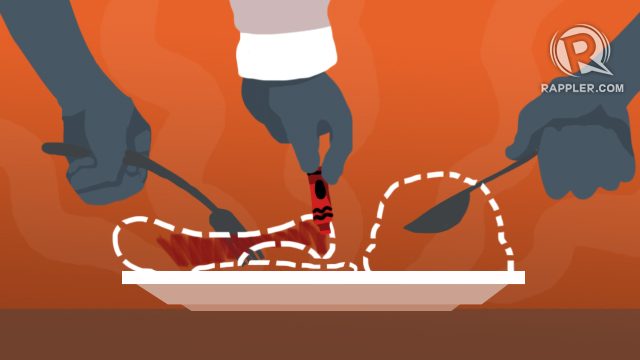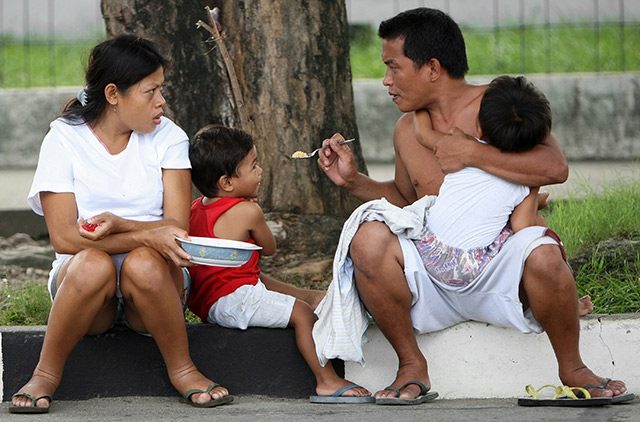SUMMARY
This is AI generated summarization, which may have errors. For context, always refer to the full article.

MANILA, Philippines – An international law identifies access to adequate food as a basic human right, but this might not be the case in the Philippines.
The country signed the International Covenant on Economic, Social and Cultural Rights (ICESCR) of the United Nations – a commitment to fulfill every person’s right to adequate food in each member-country.
However, according to Akbayan Partylist Representative Ibarra “Barry” Gutierrez III, the 1987 Philippine Constitution speaks little of this right.
“The right to adequate food is not explicitly guaranteed in Philippine law,” he explained. “Kung makikita ang 1987 Constitution ay may basis naman pero hindi klaro (If you read the Constitution, there is a basis but it’s not very clear).”
The lack of a “concrete law” blurs who is responsible for the 3 million Filipino families who went hungry during the 1st quarter of 2015 or the 7 out of 10 households who still do not have enough means to buy adequate food.
House Bill 3795 seeks to set things straight. Once enacted into law, the bill will finally put responsibility on different government agencies to address the issue of hunger.
Also called the Zero Hunger Bill, it aims to address the food insecurity problem in the country through a “whole-of-government approach.”
The “Zero Hunger Bill dictates that the fulfillment of the right to adequate good is the responsibility of the state,” Gutierrez emphasized.
The bill requires government to improve over time the access by rural communities to productive resources, food production areas, nutrition awareness, and budget for research and creation of programs, among others.
Solve age-old problem in 10 years?
Hunger and poverty-related bills which are still pending are already great initiatives. However, outside of legislation, it is important that stakeholders identify access to sustenance as beyond seasonal feeding programs.
“The right to adequate food is not a matter of charity but a human right,” Gutierrez explained.
The problem of hunger among Filipinos has been persistent. Together with the unchanging incidence of poverty, the existence of these problems continues to challenge the notion of “economic growth” in the country.
“Ang kambal na problema na ito ay sinasabi na matagal na dito at matagal na rin hinahanapan ng solusyon,” National Food Coalition (NFC) convener Aurea Teves said. “Ang ating hakbang sa pagsugpo sa gutom ay isang hakbang papunta sa pagtupad ng seguridad sa pagkain.”
(A lot of time has been spent finding the right solution to these twin problems. One step toward ending hunger is a step towards ensuring food security in the Philippines.)

The Zero Hunger Bill tasks the government to set clear policies to end hunger in 10 decades. Some may say it is not possible – considering the Philippines’ failure to achieve the hunger aspect of the Millennium Development Goals – but the right measures can quickly change the game.
“Sa dulo ay gusto natin mawala ang incidence ng gutom,” Gutierrez said. “Nagawa ito ng Brazil so talagang posible na mawala ang mga nagugutom sa bansa natin.”
(At the end, we just want to end the incidence of hunger. If Brazil can do it in less time, it is possible to do it in the Philippines.)
Brazil’s Zero Hunger Program was included in their Constitution in 2000. It holds the state accountable for fulfilling the right to adequate food for all people in their country.
This is not impossible to replicate, Gutierrez emphasized. The Philippines just needs to implement straight-to-the-point measures.
“Kailangan lang ng malinaw na programa, malinaw na direksyon, malinaw na pag-atas ng responsibilidad sa mga ahensya,” he explained. “Dapat din na may malinaw na mekanismo para ang mga stakeholders – ang mga nagugutom – para makasama sila sa paggawa ng mga importanteng programa.”
(We need a clear program, clear direction, and clear division of responsibilities among government agencies. There should also be a clear mechanism on how stakeholders – especially those suffering from hunger – can participate in policy-making processes.)
The House Committee on Human Rights recently approved the Zero Hunger Bill and is set to be deliberated by the Committee on Appropriations before it is tackled in the plenary.
With less than a year to go before the elections, First Congressional District of Davao City Representative Karlo Nograles remains positive that the fight against hunger will be set in stone via Philippine law.
“We sincerely hope that the Zero Hunger Bill will be passed before the current administration ends,” he said. – Rappler.com
Add a comment
How does this make you feel?
There are no comments yet. Add your comment to start the conversation.